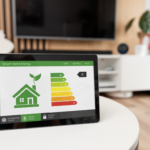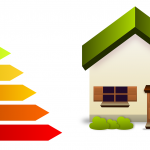An Energy Performance Certificate (EPC) rates a property’s energy efficiency from A (most efficient) to G (least efficient). Improving EPC rating can help lower energy bills, increase the property’s value, and ensure compliance with rental regulations if you are a landlord. This guide outlines steps to improve your EPC rating, whether moving from E to…
Category Archives: EPCs
What Do EPC Ratings Mean? Energy Performance Certificate Ratings Explained
If you own, buy, or rent a property in the UK, you must understand the significance of an Energy Performance Certificate (EPC) and what each rating means. This guide explains what an EPC is, defines each rating, explores property features that affect these ratings, and examines how a rating can be improved. At Falcon Energy,…
An EPC Checklist: How To Prepare For An EPC Assessment
An Energy Performance Certificate (EPC) is an essential document that clearly explains a building’s energy efficiency and environmental impact. Whether you’re selling, renting, or improving your property, an EPC is a legal requirement that helps determine your home’s energy rating and highlights areas for improvement. Being well-prepared for an EPC assessment with a checklist saves…
The Government EPC Register
In today’s era of increasing environmental consciousness and energy efficiency, understanding and optimising the energy performance of buildings has become more crucial than ever. But what exactly is an EPC, and why is it so important? An EPC is a document that assesses the energy efficiency of a property, providing valuable insights into how much…
How to Improve an EPC Rating in a Flat
Improving the Energy Performance Certificate (EPC) rating of a flat is not only beneficial for reducing energy consumption and greenhouse gas emissions, but it can also lead to lower energy bills and increased comfort for residents. Whether you are a homeowner or a tenant, there are several effective strategies that can be implemented to enhance…
WHAT DOES AN EPC ASSESSMENT INVOLVE?
What does an EPC Assessment Involve? An Energy Performance Certificate (EPC) measures the energy efficiency of residential properties and rates it on a sliding scale depending on how efficient it is. Ratings are from A-G with A being the most efficient and G being the least. If you’re looking to sell or rent your home,…
Building Regulation Compliance 2023: The Ultimate Guide
Are you embarking on a construction project in the UK? It’s crucial to understand the ins and outs of building regulations compliance. Compliance ensures that your buildings are safe, energy-efficient, and environmentally friendly. In the UK, there are several key regulations in the Approved Document for building regulation in England you need to be aware…
Do Listed Buildings Need An EPC?
Introduced in 2007, Energy Performance Certificates (EPC’s) are a measure of the energy efficiency of a building, with ratings scaled between A (very efficient) – G (inefficient). Domestic, privately leased buildings that require an EPC are also subject to Minimum Energy Efficiency Standards (MEES). Although mandatory by law for the construction, sale or leasing of…
How To Plan A Sustainable New Build
When it comes to new home development, sustainability, energy efficiency and eco friendly housing is now one of the most important factors to home buyers. With homes being the cause of a large proportion of carbon emissions, the government is introducing even more schemes to ensure that new build homes are as environmentally friendly and…
How To Make Commercial Buildings More Energy Efficient
With energy efficiency becoming a huge focus for the UK government, homeowners and businesses are increasingly looking for ways to not only save money on energy costs, but to help reduce energy consumption and carbon footprint. Businesses of all sizes tend to use more energy throughout the day, whether you work in an office and…










